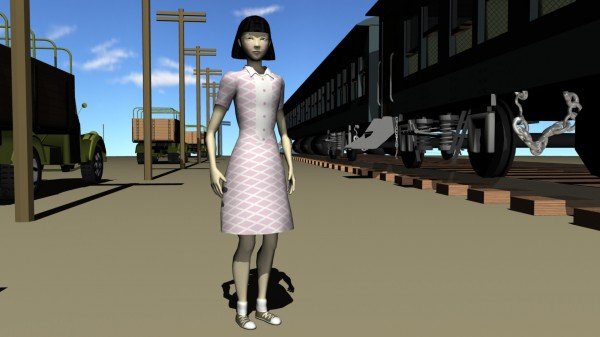
Our internal e-mail lists have us discussing all kinds of stuff: Asian American identity, representation in the media, the experiences of activism in an academia setting and its progression as we transition to the working, adult world. And sometimes we talk about “Drama in the Delta,” a 3D video game about Japanese Internment Camps. Sometimes, that conversation starts out snarky but ends up being pretty thought provoking discussion about internment camp life, thanks to Koji. All that and a bag of chips, coming right up.
Moye: Really? Really?
Ernie: There are about 15 snarky comments I had, all of which I self-censored because even I have a fine line. Right down to the fact that there is judo combat in the game. THERE IS JUDO COMBAT IN A GAME ABOUT INTERMENT CAMPS.
Moye: I had to reread the part about drag shows.
Koji: Well, to be fair, there was judo in the camps. I doubt the drag show part.
Mike L: Admittedly, I learned a little something. I had no idea they had a “Womanless Wedding” performance at these camps. I kind of want to play this game just to see the 3D rendered animation of that scene.
Susan: The screenshots from the trial look a bit like Dora the Explorer meets Schindler’s List.
Ernie: Soundbite of the century, Susan.
Akrypti: This irritates me on so many levels but the heart of it is this: respect. The only way you can possibly conceive of this absurd video game idea is of you lack respect for what happened during Japanese internment.
Ernie: What about as an educational tool? Since it looks like the staff seems to all be involved with academia of some sort. That said, I hope that I can do to do quarter-circle-forward + punch to land some sweet judo throws.
Jeff: The game is done by the San Diego Supercomputer Center at UCSD and UCSD’s dance and theatre department and seems to be intended as an educational tool. It looks like they have some grant money from the National Endowment for the Humanities.
Koji: I didn’t really look at this site too closely because frankly I think about the camps every single day at Japanese American National Museum and today I’m off of work, but I think in theory it’s okay to have to have a video game of the camp, just like it’s okay to have a comedy in the camp. For me, I think the most important thing is that people learn about it and what happened. Sadly, a lot of people don’t know it happened.
One of the things about the camp experience that I like to remember is that these people made the best of a bad situation. They tried to live their lives to their fullest. I think there is something very special in that. I wish more of the conversations about the camps talk about that aspect of the camp experience. […] The way people remember the camp is based on their personality. So if you were a negative person or angry before camp, you probably felt that way about the camp. If you were happy and half full kind of person you probably looked at camp that way. That’s why some people had great experiences and others had horrible experiences… the important part of it was not what they went through but the civil rights violations and racism.
Mike L: Wow, Koji. You should totally turn everything you just wrote into a post.
Moye: I just have to agree with Koji’s last part. My grandfather had really fond memories of his camp. He always told me stories about discrimination and racism but he told me he had tons of fun, since he just ran around with his friends all day. I’m sure it would have been a very different story if he had been older with a family to support and a business to lose.
Susan: That reminds me of the stories I hear about the plantations here–my dad has great stories about his dad, and about all the Filipino/Korean/Chinese family parties he himself went to, but he didn’t have to face as much of the inbred racism that created the plantation system in the first place.








